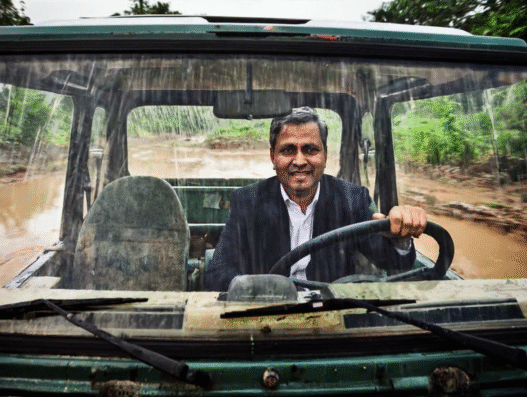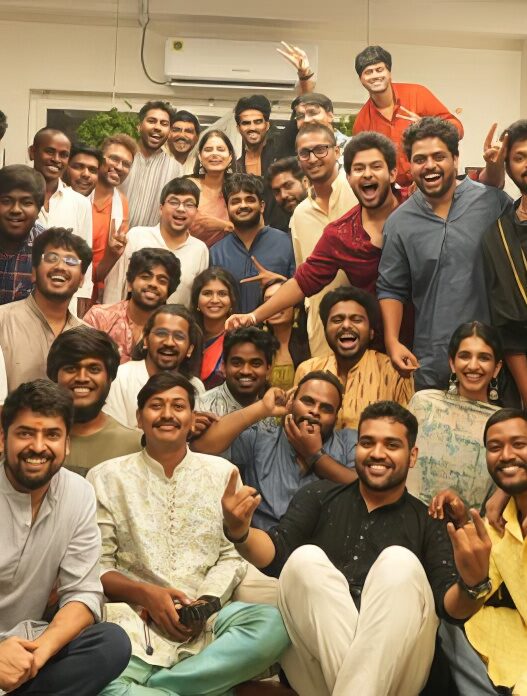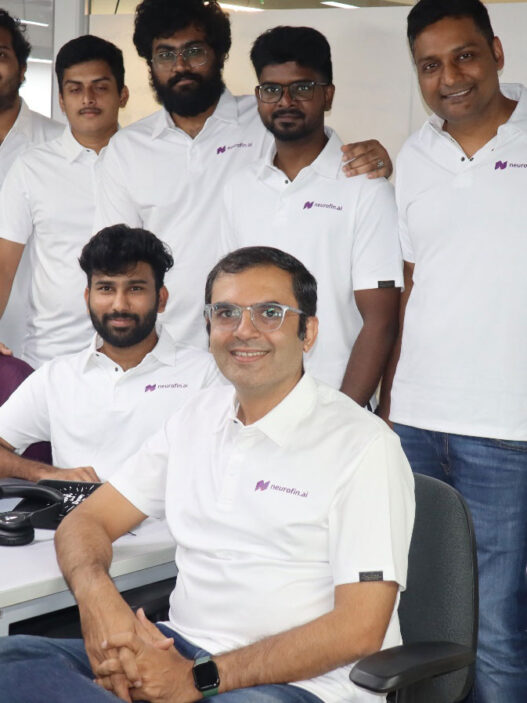In 2017, somewhere deep in the monsoon-soaked fields of Odisha, a muddy jeep sputtered through the backroads. Behind the wheel: Dr. Prithwi Singh, a food scientist who had walked away from the sterility of corporate R&D labs. He wasn’t chasing a patent. He was chasing something older—millet grains stored in clay pots by tribal farmers, preserved for years without chemicals.
That trip changed everything.
Today, eight monsoons later, Singh’s company Khetika has just raised $18 million (₹154 crore), positioning itself as one of the leading forces in India’s clean food revolution.
Seeds of Disruption: The Khetika Formula
Prithwi Singh didn’t start Khetika to make granola bars. He started it because something about India’s “organic” shelves felt like a lie. Labels screamed health, but the ingredients whispered palm oil, preservatives, and supply chains nobody could trace.
His solution was refreshingly simple: partner directly with farmers growing ancient grains like foxtail millet, sorghum, and barnyard millet. No brokers. No middlemen. And definitely no synthetic junk.
“Grandmothers preserved millets naturally. We just scaled that wisdom.”
— Dr. Prithwi Singh, Founder, Khetika
This wasn’t just talk. Khetika built micro-processing hubs in millet-growing belts. They invested in packaging tech that kept grains fresh without artificial preservatives. And they obsessed over transparency—every Khetika pack can be scanned to show the farmer’s name, location, and harvest date.
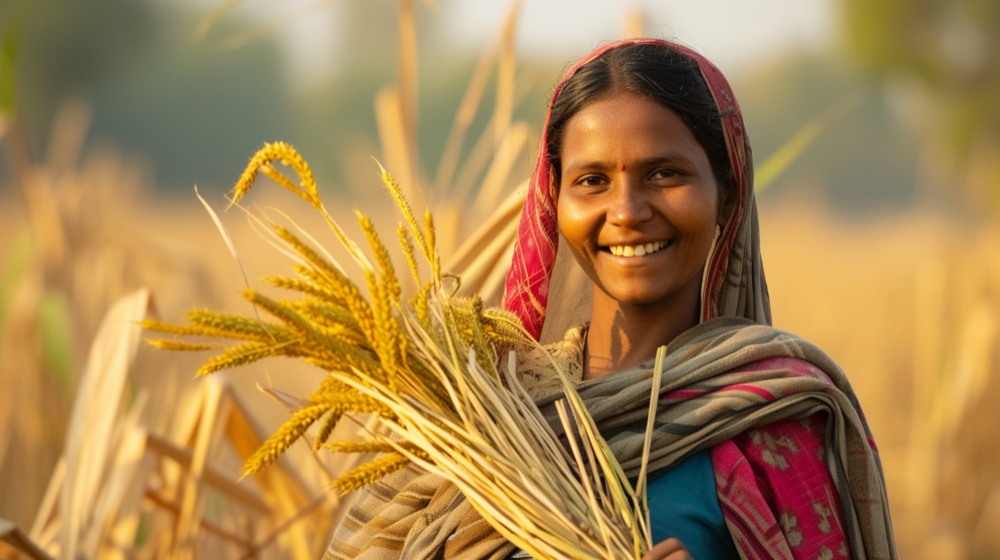
Khetika’s Journey in Numbers
| Metric | FY 2023 | FY 2025 (Now) | Growth |
|---|---|---|---|
| Revenue | ₹123.7 Cr | ₹247 Cr | 2X |
| Monthly Orders | 900K | 1.8M+ | 2X |
| Farmer Partners | 12,500 | 25,000 | 2X |
| Retail Reach | 8 states | 14 states | +75% |
More than 75% of Khetika’s orders come through India’s humble kirana stores—powered by new demand-forecasting apps the company developed in-house. This is how clean food reached India’s back alleys, not just its posh pantries.
The Clean Plate Club: Competitors, Not Clones
Khetika isn’t alone in this fight. The Indian health food wave has grown into a full-on $30 billion industry (projected by 2026), spawning a new generation of brands hell-bent on cleaning up what we eat.
1. Troo Good: With ₹5 millet chikkis, it moves 2 million packs daily, thanks to school nutrition programs.
2. Slurrp Farm: Think dinosaur-shaped millet noodles that Gen Alpha actually likes. It now dominates Amazon’s “healthy snacks” for kids.
3. The Whole Truth: Protein bars that proudly list every ingredient, no artificial sweeteners, and a 200% growth streak.
4. Evlogia Eco Care: Not food, but vital—replaces plastic with coconut husk packaging. Over 5 tons of plastic gone in 2024 alone.
“We’re allies against Big Junk Food.”
— Shauravi Malik, Co-founder, Slurrp Farm
This is a movement, not a turf war.
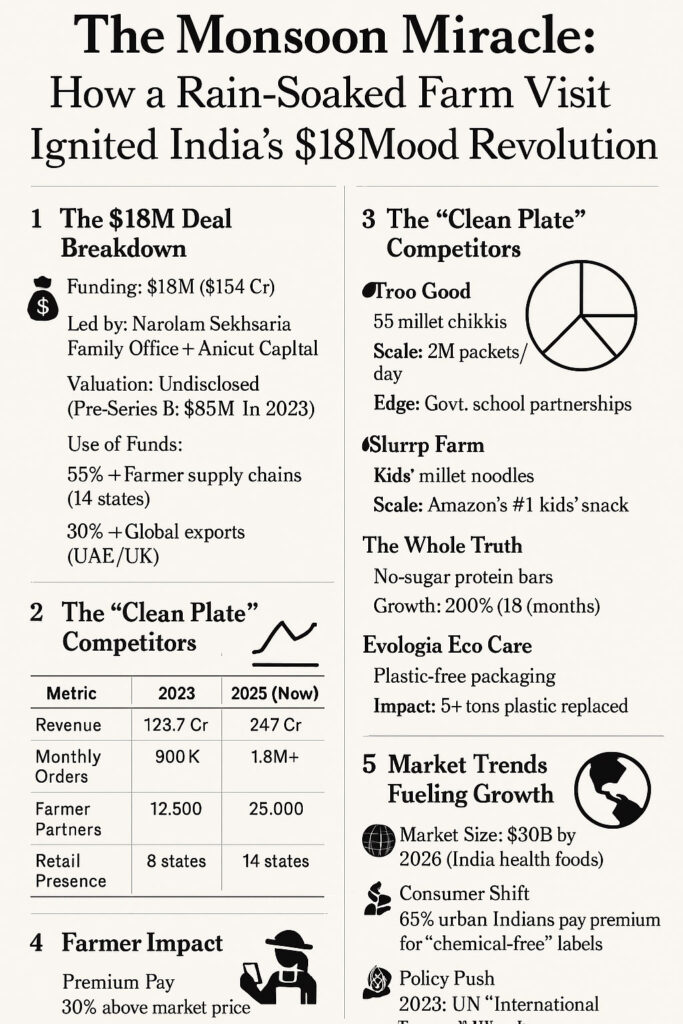
The $18 Million Bet
Khetika’s latest round wasn’t just venture capital chasing a fad. It was conviction capital.
Lead Investors:
- Narotam Sekhsaria Family Office (yes, the Ambuja Cement heir)
- Anicut Capital
Where the Money’s Going:
- 55% to strengthen farmer supply chains across 14 states
- 30% into nano-factories (Delhi, Gujarat) to decentralize food processing
- 15% toward export expansion (UAE, UK)
Sekhsaria reportedly made up his mind after tasting a turmeric millet khichdi at a tasting event. The flavor sealed the deal—but the math was equally compelling:
- 28% gross margins, thanks to farmer-direct sourcing
- Massive policy tailwinds with the Modi government’s millet push
- Export hunger from Dubai and London health cafés chasing “Made-in-India” purity
Farmers: From Margin to Spotlight
This is where it gets real.
Lakshmi, a millet farmer in Telangana, pulls out her phone and scans a QR code from a Khetika pack. Her photo appears. GPS coordinates of her field show up. That packet of khichdi? It came from her harvest.
“They pay 30% over market price. My daughter studies engineering now.”
— Lakshmi, Telangana
For thousands of farmers like her, Khetika has been more than a buyer. It’s been a platform, a promise, and a lifeline. The company plans to onboard 10,000 more farmers like her in the next 12 months.
The Shelf-Life Struggle
Of course, not everything’s as smooth as hot rotis.
Millets, unlike rice or wheat, have a tendency to go rancid quickly. That’s the one chink in the “no preservatives” armor. Khetika’s R&D lab in Gujarat is deep in what they call the “shelf-life wars.”
“Millets turn in weeks. We’re racing to crack it.”
— Head of R&D, Khetika
They’ve made progress using edible oxygen-absorbing sachets and vacuum-sealed eco-packs. But this is where the science still trails the mission.
The Bigger Plate: What’s Cooking Next?
1. Kirana Tech Revolution
Khetika’s offline sales army—mom-and-pop kiranas—are getting upgraded with demand-tracking apps. This helps avoid overstocking and cuts waste by 22%.
2. Climate Warrior Crops
Millets require 70% less water than rice, survive in droughts, and restore soil health. They’re being dubbed “the climate crops” for a reason.
3. The Global Desi Superfood Boom
Khetika’s turmeric-millet dosa mix is already getting sampled by London’s Whole Foods buyers. At £12 a pack, they’re selling not just food—but culture.
Why This Matters
India’s processed food industry has a trust deficit. Labels lie. Sugar hides behind aliases. What Khetika and its tribe are doing isn’t just selling snacks—it’s restoring credibility. One transparent pack at a time.
With Tata and Reliance sniffing around the category and M&A chatter heating up, the real gold might not be the grains—but the trust encoded in every QR-tagged pack.
“We’re not selling health food. We’re selling trust.”
— Dr. Prithwi Singh








